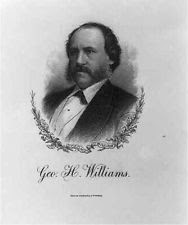 |
Worthy Brown's Daughter
Phillip Margolin
(HarperCollins, 2014)
|
Former attorney and author, Phillip Margolin, was compelled to write Worthy Brown’s Daughter when he read of a court case that took place in the Oregon Territory in 1850’s. A slave family named Holmes was brought to the Oregon Territory by their owner, Colonel Nathaniel Ford, with the understanding that they would work as indentured servants for Ford for a number of years, after which they would be freed. The Holmes family upheld their part of the bargain but when the time came for Ford to free them, Ford freed the parents and one young child, but kept the family’s other children. The family found a white lawyer who agreed to represent them and sued Ford for the return of their children. In 1853 the Oregon Supreme Court Justice, the Honorable George Williams, ruled in the family’s favor but one child had already died in Ford’s care. Margolin was so moved by this story that he decided to write a historical novel based on this sad situation.
The result is Worthy Brown’s
Daughter set in Portland, Oregon in 1860 when Oregon was a new state (having
achieved statehood in 1858), and the legal system still had a Wild West quality
to it. Worthy Brown, a freed slave, is faced
with a problem similar to the Holmes family.
His former owner, Caleb Barbour, a scoundrel and an unscrupulous lawyer,
reneged on his agreement to free both Brown and his young daughter Roxanne if
Brown worked as an indentured servant for Barbour.
Worthy Brown meets a young lawyer Matthew Penny, newly arrived in
Oregon and still grieving the death of his young wife on the Oregon Trail
crossing, and asks Penny to help him free Roxanne from Barbour. Penny takes the case but complications arise,
people die, others fall in love. Meanwhile, Penny
is faced with a moral dilemma that threatens to destroy both himself and Worthy
Brown.
Margolin uses compelling characters to tell his story. Some are lawyers, others are wealthy movers
and shakers in the state of Oregon, while some are unsavory individuals drawn
to the opportunities in the West. Occasionally
the characters sound a bit “wooden” but it doesn’t detract from the story. Margolin's experience as a criminal defense attorney adds realism to the legal strategizing and court scenes.
 |
| Picture of author Phillip Margolin (Photo courtesy of Portland Tribune, Jaime Valdez) |
The plot moves quickly, demonstrating Margolin’s background in suspense. His prose is terse and to the point,
befitting one in the legal profession. The
reader also gets a historical perspective of Portland during this time period. In the author’s notes, he indicates when he
has taken liberties with dates of actual events.
My niece gave me this book, and it turned out to be enjoyable
summertime reading. Thanks, Carrie!







